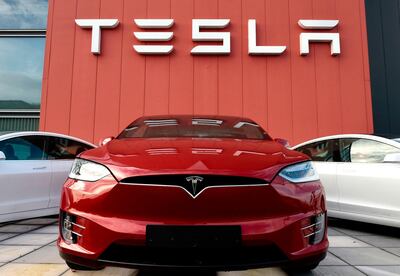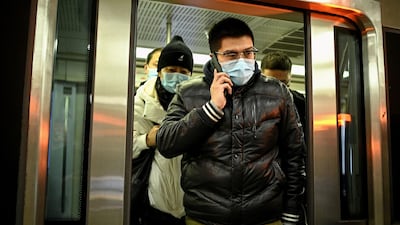Technology has never been more fundamental to the way we live, and the Covid-19 pandemic has only made that integration stronger. When the virus kept us physically apart, our gadgets kept us connected. They were also central to the contact tracing that endeavoured to keep us safe. We can be thankful that such advanced technology was on hand to help us navigate such an extraordinary year, and yet its critical role has put huge power and control in the hands of a small number of private companies. That inherent tension is set to become even more profound this year.
Working lives across the globe will continue to be disrupted over the next few months, as governments and businesses encourage people to work from home to keep the virus at bay while vaccination programmes are implemented and inoculations take place. But technology has shouldered the burden of mass remote working so effectively that it may well be here to stay.
As our homes adopt new identities, doubling as office spaces, classrooms and gyms, we’ll continue to reach for emerging smart home technology, from air purifiers to smart workout mirrors, from digital whiteboards to a mass of entertainment streaming services. The way we communicate will also continue to drift away from text and towards video and audio. Less focus on the keyboard, more on each other. That change will have voice assistants continue their rise to ubiquity.
Augmented, extended and virtual reality will facilitate new advances in education and health. After all, even when the threat of the virus eventually subsides, remote teaching and remote diagnosis will stand to benefit millions of people worldwide. Wearables will log ever more detailed health data, and the idea of physically visiting a doctor may soon become outmoded. The coronavirus has accelerated technological development in other areas, too, most notably the expansion of Amazon's chain of Go stores, where checkout-free shops use cameras and AI to track shoppers and bill them automatically.
Nearly every field of technology will take greater advantage of 5G this year. Last year was meant to be its big moment, but the pandemic caused well-laid plans to be scrapped. In recent months, however, a clutch of new 5G phones – most notably the iPhone 12 range – have been eagerly snapped up by consumers.
According to Swedish company Ericsson, there are already 218 million 5G subscriptions worldwide, a number that has outstripped predictions. Despite conspiracy-fuelled fears about the technology, it is clear that there is now huge demand for it. Devices will become cheaper and networks will continue to expand; 60 per cent of the global population should be reached by 2026, making 5G the fastest-deployed mobile network ever. The impact of this will be felt not only on a personal level, but also across all industries, from farming to gaming, as automation and connectivity come together to create the much-touted “Internet of Things”.
One sector that will benefit hugely from this connectivity is the car industry. Elon Musk, chief executive of Tesla, announced on December 20 that the company will launch its Full Self-Driving subscription early this year, which “enables a new level of safety and autonomy”. Without regulatory approval, human drivers will still be legally responsible for their vehicles, but FSD is set to “offer more insight into how your Tesla perceives the world around you and future Full Self-Driving Capabilities”. Think of it as a proof of concept, reassuring the public that this technology actually works. Meanwhile, across the world, from Arizona to Shanghai, driverless taxis are waging a similar PR drive, carrying passengers safely to their destinations.
The use of 5G will also mean a big increase in the amount of data being generated by us and by machines. That means more computer analysis of how the world works, and algorithms getting better at predicting behaviour. This will inevitably be met with pushback from privacy campaigners.
Facial recognition systems came in for sustained criticism last year, as the implications on civil liberties began to be more widely understood; as a consequence, IBM and Microsoft announced their systems would not be made available to law enforcement agencies. The question of who gets to see the data we generate cannot be forgotten.
Growing piles of data also means a greater dependence on security to keep it safe. Passwords, for so long the ineffective gatekeeper of personal and corporate information, will have to take more of a back seat. Every minute of every day, cyber crime costs the global economy $2.9 million, with about 80 per cent of those attacks directed at password-cracking. Microsoft announced in recent weeks its vision of passwordless access for all its customers this year. More of us will begin to use hardware keys to secure access to the services we use, and not before time.
It’s become traditional to label every year a bad one for Facebook, but in fact every social media network has suffered reputational damage over the past 12 months. The dominance of Facebook, Google and Amazon is set to be challenged by several lawsuits in several territories this year, as lawmakers take action over data privacy, misinformation and anti-competitive behaviour.
But what about the gadgets that used to make technology such a carefree topic of conversation? The entirely virtual CES show, due to take place on Monday, January 11, will have Samsung launch rival phones to the iPhone 12, continue its commitment to foldable tech, and new screens that it's boldly calling "future of the display". It's a small reminder that technology, despite its critical role in society, can still generate a small buzz of excitement for those who love a shiny new toy to play with.
Specs
Engine: Dual-motor all-wheel-drive electric
Range: Up to 610km
Power: 905hp
Torque: 985Nm
Price: From Dh439,000
Available: Now
Explainer: Tanween Design Programme
Non-profit arts studio Tashkeel launched this annual initiative with the intention of supporting budding designers in the UAE. This year, three talents were chosen from hundreds of applicants to be a part of the sixth creative development programme. These are architect Abdulla Al Mulla, interior designer Lana El Samman and graphic designer Yara Habib.
The trio have been guided by experts from the industry over the course of nine months, as they developed their own products that merge their unique styles with traditional elements of Emirati design. This includes laboratory sessions, experimental and collaborative practice, investigation of new business models and evaluation.
It is led by British contemporary design project specialist Helen Voce and mentor Kevin Badni, and offers participants access to experts from across the world, including the likes of UK designer Gareth Neal and multidisciplinary designer and entrepreneur, Sheikh Salem Al Qassimi.
The final pieces are being revealed in a worldwide limited-edition release on the first day of Downtown Designs at Dubai Design Week 2019. Tashkeel will be at stand E31 at the exhibition.
Lisa Ball-Lechgar, deputy director of Tashkeel, said: “The diversity and calibre of the applicants this year … is reflective of the dynamic change that the UAE art and design industry is witnessing, with young creators resolute in making their bold design ideas a reality.”
More from Neighbourhood Watch:
The biog
Favourite pet: cats. She has two: Eva and Bito
Favourite city: Cape Town, South Africa
Hobby: Running. "I like to think I’m artsy but I’m not".
Favourite move: Romantic comedies, specifically Return to me. "I cry every time".
Favourite spot in Abu Dhabi: Saadiyat beach
Benefits of first-time home buyers' scheme
- Priority access to new homes from participating developers
- Discounts on sales price of off-plan units
- Flexible payment plans from developers
- Mortgages with better interest rates, faster approval times and reduced fees
- DLD registration fee can be paid through banks or credit cards at zero interest rates
Where to donate in the UAE
The Emirates Charity Portal
You can donate to several registered charities through a “donation catalogue”. The use of the donation is quite specific, such as buying a fan for a poor family in Niger for Dh130.
The General Authority of Islamic Affairs & Endowments
The site has an e-donation service accepting debit card, credit card or e-Dirham, an electronic payment tool developed by the Ministry of Finance and First Abu Dhabi Bank.
Al Noor Special Needs Centre
You can donate online or order Smiles n’ Stuff products handcrafted by Al Noor students. The centre publishes a wish list of extras needed, starting at Dh500.
Beit Al Khair Society
Beit Al Khair Society has the motto “From – and to – the UAE,” with donations going towards the neediest in the country. Its website has a list of physical donation sites, but people can also contribute money by SMS, bank transfer and through the hotline 800-22554.
Dar Al Ber Society
Dar Al Ber Society, which has charity projects in 39 countries, accept cash payments, money transfers or SMS donations. Its donation hotline is 800-79.
Dubai Cares
Dubai Cares provides several options for individuals and companies to donate, including online, through banks, at retail outlets, via phone and by purchasing Dubai Cares branded merchandise. It is currently running a campaign called Bookings 2030, which allows people to help change the future of six underprivileged children and young people.
Emirates Airline Foundation
Those who travel on Emirates have undoubtedly seen the little donation envelopes in the seat pockets. But the foundation also accepts donations online and in the form of Skywards Miles. Donated miles are used to sponsor travel for doctors, surgeons, engineers and other professionals volunteering on humanitarian missions around the world.
Emirates Red Crescent
On the Emirates Red Crescent website you can choose between 35 different purposes for your donation, such as providing food for fasters, supporting debtors and contributing to a refugee women fund. It also has a list of bank accounts for each donation type.
Gulf for Good
Gulf for Good raises funds for partner charity projects through challenges, like climbing Kilimanjaro and cycling through Thailand. This year’s projects are in partnership with Street Child Nepal, Larchfield Kids, the Foundation for African Empowerment and SOS Children's Villages. Since 2001, the organisation has raised more than $3.5 million (Dh12.8m) in support of over 50 children’s charities.
Noor Dubai Foundation
Sheikh Mohammed bin Rashid Al Maktoum launched the Noor Dubai Foundation a decade ago with the aim of eliminating all forms of preventable blindness globally. You can donate Dh50 to support mobile eye camps by texting the word “Noor” to 4565 (Etisalat) or 4849 (du).
SERIES INFO
Schedule:
All matches at the Harare Sports Club
1st ODI, Wed Apr 10
2nd ODI, Fri Apr 12
3rd ODI, Sun Apr 14
4th ODI, Sun Apr 16
UAE squad
Mohammed Naveed (captain), Rohan Mustafa, Ashfaq Ahmed, Shaiman Anwar, Mohammed Usman, CP Rizwan, Chirag Suri, Mohammed Boota, Ghulam Shabber, Sultan Ahmed, Imran Haider, Amir Hayat, Zahoor Khan, Qadeer Ahmed
Zimbabwe squad
Peter Moor (captain), Solomon Mire, Brian Chari, Regis Chakabva, Sean Williams, Timycen Maruma, Sikandar Raza, Donald Tiripano, Kyle Jarvis, Tendai Chatara, Chris Mpofu, Craig Ervine, Brandon Mavuta, Ainsley Ndlovu, Tony Munyonga, Elton Chigumbura
More from Neighbourhood Watch
The%20specs
%3Cp%3E%3Cstrong%3EPowertrain%3A%20%3C%2Fstrong%3ESingle%20electric%20motor%0D%3Cbr%3E%3Cstrong%3EPower%3A%20%3C%2Fstrong%3E201hp%0D%3Cbr%3E%3Cstrong%3ETorque%3A%20%3C%2Fstrong%3E310Nm%0D%3Cbr%3E%3Cstrong%3ETransmission%3A%20%3C%2Fstrong%3ESingle-speed%20auto%0D%3Cbr%3E%3Cstrong%3EBattery%3A%20%3C%2Fstrong%3E53kWh%20lithium-ion%20battery%20pack%20(GS%20base%20model)%3B%2070kWh%20battery%20pack%20(GF)%0D%3Cbr%3E%3Cstrong%3ETouring%20range%3A%20%3C%2Fstrong%3E350km%20(GS)%3B%20480km%20(GF)%0D%3Cbr%3E%3Cstrong%3EPrice%3A%20%3C%2Fstrong%3EFrom%20Dh129%2C900%20(GS)%3B%20Dh149%2C000%20(GF)%0D%3Cbr%3E%3Cstrong%3EOn%20sale%3A%3C%2Fstrong%3E%20Now%3C%2Fp%3E%0A
Specs
Engine: 51.5kW electric motor
Range: 400km
Power: 134bhp
Torque: 175Nm
Price: From Dh98,800
Available: Now
Racecard
%3Cp%3E%0D5pm%3A%20Al%20Maha%20Stables%20%E2%80%93%20Maiden%20(PA)%20Dh80%2C000%20(Turf)%201%2C400m%0D%3Cbr%3E5.30pm%3A%20Al%20Anoud%20Stables%20%E2%80%93%20Handicap%20(PA)%20Dh80%2C000%20(T)%201%2C200m%0D%3Cbr%3E6pm%3A%20Wathba%20Stallions%20Cup%20%E2%80%93%20Handicap%20(PA)%20Dh70%2C000%20(T)%201%2C400m%0D%3Cbr%3E6.30pm%3A%20Arabian%20Triple%20Crown%20Round%202%20%E2%80%93%20Group%203%20(PA)%20Dh%20300%2C000%20(T)%202%2C200m%0D%3Cbr%3E7pm%3A%20Liwa%20Oasis%20%E2%80%93%20Group%202%20(PA)%20Dh300%2C000%20(T)%201%2C400m%0D%3Cbr%3E7.30pm%3A%20Dames%20Stables%20%E2%80%93%20Handicap%20(TB)%20Dh80%2C000%20(T)%201%2C400m%3C%2Fp%3E%0A
More on Quran memorisation:
The years Ramadan fell in May
The specs
Engine: 2.0-litre 4-cylinder turbo
Power: 258hp from 5,000-6,500rpm
Torque: 400Nm from 1,550-4,000rpm
Transmission: Eight-speed auto
Fuel consumption: 6.1L/100km
Price: from Dh362,500
On sale: now
More from Rashmee Roshan Lall




